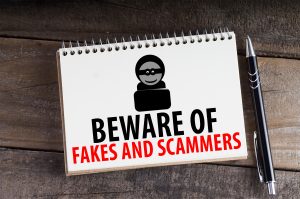Tips For Protecting Yourself From Scammers

These days it seems like there are an incredible number of scams going on. We receive scam text messages, scam phone calls, scam Facebook friend requests and more. Even when we think we know how to spot a scam we can still be caught unaware. Here are some things that should raise a red flag if you encounter them in your everyday life:
-Never send money via gift card or wire transfer to someone that you have never met face to face. If someone asks you to do one of those things, you should immediately be suspicious it is because it cannot be traced.
-Avoid clicking on links or opening attachments in unsolicited emails. When you clink on a link in a scam email it will download malware onto whatever device you are using, allowing cyber thieves to steal your identity. Be cautious even when the email looks familiar. Sometime the scammer will use an email address with just one letter or punctuation off so that it looks legitimate even when it is not. When in doubt, delete the email and block the sender.
-Never share personally identifiable information with people that you don’t know. Whether someone is reaching out to you over the phone, online or knocking on your door think twice about sharing any personal information with them. This includes big information such as bank numbers or birthdays but even avoid telling them the names of the people in your household if you can. Even by just giving them your name and confirming you live at that address can make you susceptible to being taken advantage of.
-Resist the pressure to act immediately. Con artists are really good at playing up your emotions, fear especially. Some scammers may call and say that someone has been arrested or is in the hospital and they need something from you “right now”. By scaring you they are hoping you will give up more information than you would if you were thinking rationally.
-Make sure all of your online purchases are secure. If you are buying from a company that you have never heard of look for reviews of the company online to make sure that they are legitimate.
-Be cautious about what you share on social media. Consider only connecting online with people you already know in person. Check your privacy settings regularly to make sure that you know who is seeing your information. Imposters often get information about their targets from their social media pages and then play it off like they know you because of how much they know about you.
For more information about other scams and ways to protect yourself you can check out this Better Business Bureau article.
https://www.bbb.org/article/scams/8767-bbb-tips-10-steps-to-avoid-scams
